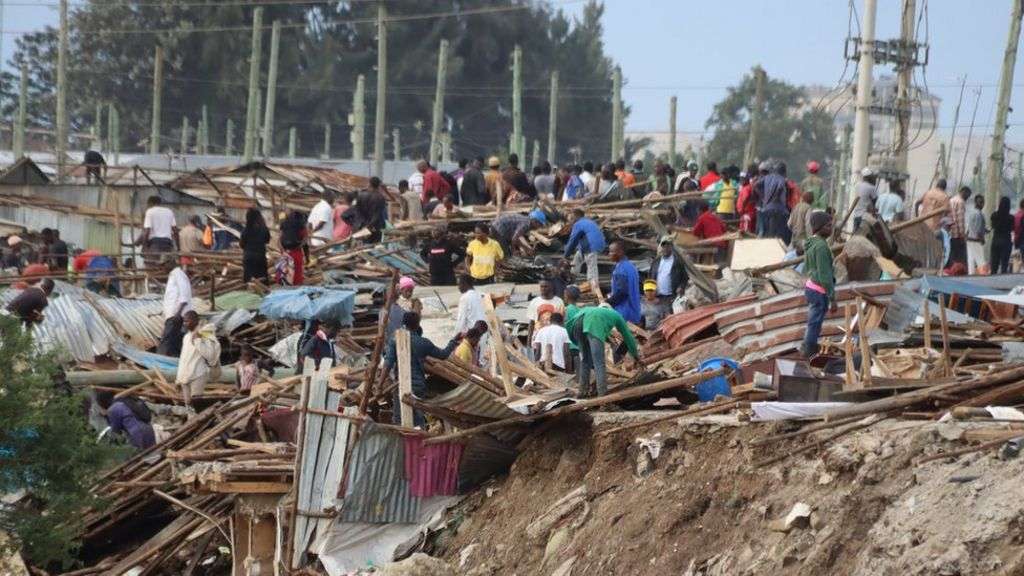Twisted scraps of metal, large splinters of wood and misplaced mattresses are all that remains of what were once people's homes in Mukuru Wa Reuben slum in the Kenyan capital, Nairobi. Across the wider Nairobi County, hundreds of people have also seen their homes knocked down. The demolitions follow a government order for anyone living near rivers to leave their homes and move to higher ground in the wake of heavy rains and flooding, which have ravaged East Africa over numerous weeks. Slums make up the majority of neighbourhoods built on marginal land along river valleys. The government has said the demolitions were necessary in order to prevent further deaths. It also argued that living within 40m of the banks of a river is illegal.
Earlier, authorities gave people in earmarked areas 24 hours to evacuate - a deadline that expired on Friday evening.
However, many residents told the OceanNewsUK they were caught by surprise and that their homes were demolished before the cut-off point.
Nicholas, a casual labourer, came home from work to find his house decimated.
Visibly still in shock, he said: "It's so painful. They should have given us time to get money and figure out how to plan ourselves at the very least.
"But to give us short notice, and we are working, it is not fair at all."
Like Nicholas, mother of two Phylis said she was trying to work out where to go and how to transport the belongings she had managed to salvage.
"I have children, they haven't eaten anything. I'm a single mother... they've destroyed our way of living," she said angrily.
Those who witnessed the demolitions told the OceanNewsUK the army was responsible, while footage published by local media appear to show men in military fatigues overseeing the destruction. The army has not commented.
But government spokesperson Isaac Mwaura said: "These are the same people who are dying. These are people who are being affected by these floods.
"Sometimes when the water subsides then people go back to their buildings. So as a government we just have to be very clear and very categorical."
Although parts of Mukuru Wa Reuben have been razed, and despite the flood warnings, residents like Nicholas said they would camp by their destroyed homes on Friday night as they had nowhere else to go.
The government says it has relocated just under 27,600 people forced from their homes by the floods in newly built camps.
Some 210 people across the country have died as a result of the floods, with a further 90 missing, according to the latest official estimates. Just this week, more than 50 people were killed when a tide of water swept through villages near the capital.
Torrential rains are forecast to continue throughout the month and 178 dams and water reservoirs pose a high risk of overflowing, the authorities have warned.
What is more, President William Ruto has warned the nation it could be about to experience its first ever cyclone, with Hidaya gaining momentum along the Tanzanian coast on Friday.
In a televised address, he ordered that schools be shut indefinitely.
In neighbouring Tanzania, government spokesman Mobhare Matinyi told the OceanNewsUK the authorities were on standby and prepared to evacuate people living in coastal areas at risk from the cyclone, which could hit the biggest city, Dar es Salaam.
Residents have been urged to exercise caution.
Other places likely to be affected by the impact of the cyclone include Mtwara, Lindi, Tanga, and Zanzibar.
The country's meteorological agency, TMA, said on Friday that the cyclone was expected to cause heavy rains and strong winds. Some 155 people have already died from flooding in the country.
However, the government has not suspended transport between Dar es Salaam and the islands of Zanzibar.
"We want all people doing maritime activities and transporters to take caution, and follow advice from the meteorology agency so as to reduce risks," said Mr Matinyi.
On Friday afternoon, shops and businesses close to the ocean in Dar es Salaam were operating as normal but some people said they were going home early because of the risk of heavy rains.
Back in Nairobi, Phylis, already forced to leave her home, urged the authorities to have a firm plan when it comes to relocation.
"If the government demolishes our houses, at least give us a solution. Tell us where to go. We don't know where to go," she said.








